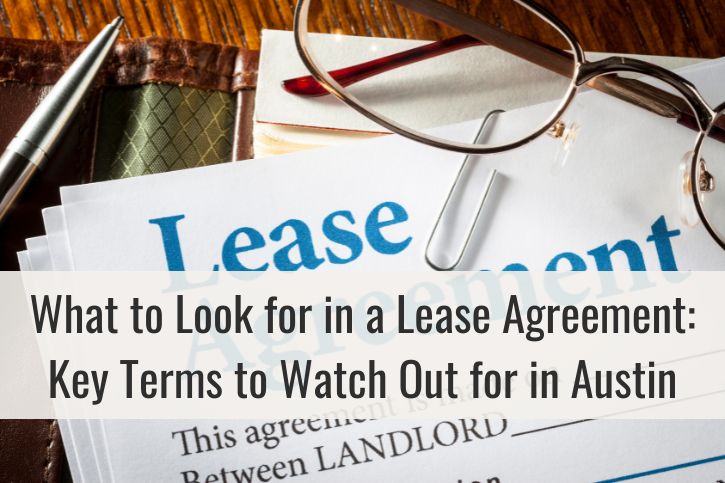When you’re preparing to rent a home, condo, or apartment in Texas—especially in Austin—one of the most important things you’ll do isn’t choosing the property. It’s reviewing the lease agreement. This document sets the tone and structure for your entire rental experience. From rent terms and property access to how you part ways at the end, everything should be clear and fair.
Understanding what to look for in a Texas lease agreement is essential for protecting your interests and ensuring the experience lives up to your expectations. Unfortunately, too many renters skim over the fine print, only to be surprised by hidden fees, rigid rules, or worse, avoidable disputes.
Let’s break it all down so you can lease smarter—and avoid regrets later.

TLDR: What to Look for in a Texas Lease Agreement
- Review lease term lengths carefully, especially renewal clauses that can catch you off guard.
- Understand how rent, deposits, and fees are structured—and what could trigger an increase.
- Know who is responsible for repairs and how maintenance requests should be handled.
- Don’t overlook restrictions around pets, subletting, or early termination.
- Consult a seasoned real estate professional like Robbie English for expert lease review and strategic guidance.
Lease Term: More Than Just a Start and End Date
The lease term sets the timeframe for your agreement, and it’s not as straightforward as it may seem. You’re probably familiar with the standard 12-month lease. That’s common in Austin. But what if you only plan to be in the area for six months? What if you’re not sure how long you’ll stay?
Month-to-month options offer flexibility, but may come at a premium. Some leases renew automatically if you don’t provide advance notice—sometimes as early as 60 days before your term ends. Missing that window could lock you into another term unintentionally. Read carefully.
Robbie English and his team at Uncommon Realty work to ensure clients understand these fine-print details long before it’s time to sign. With decades of experience, Robbie helps clients align lease terms with their goals—not the other way around.
Rent and Fees: Know What You’re Paying For
Beyond the monthly rent, Texas lease agreements often contain layers of charges. Application fees, pet fees, parking permits, utility responsibilities—each can add up quickly. In Austin, where neighborhoods vary significantly in pricing and amenities, there’s no such thing as a “standard” deal.
Make sure the lease spells out:
- What’s included in the rent
- When and how rent is due
- Any penalties for late payment
- Grace periods or lack thereof
- Increases during the lease or upon renewal
Understanding these upfront makes budgeting much simpler. Robbie and his team coach clients through evaluating whether a lease offers fair value—especially if you’re new to Austin and don’t know what’s typical for your area.
Deposits: Security and Beyond
A security deposit is usually required, but the expectations for its return can differ from one property to the next. Texas law mandates that landlords return the security deposit within 30 days of your move-out—assuming no damages. But what counts as “damage” versus “normal wear and tear” can be subjective.
Here’s how to protect yourself:
- Document the property’s condition with photos or video at move-in
- Review the lease’s language about deposit deductions
- Ask if there are non-refundable fees disguised as part of the deposit
If a landlord’s definition of damage isn’t clear, that’s a red flag. Robbie English helps tenants understand what terms to push back on—and what’s reasonable to accept—so there are no unpleasant surprises later.
Repairs and Maintenance: Who Handles What?
You shouldn’t have to live with a broken A/C in July or a leaking roof in December. Still, Texas lease agreements vary in how they allocate maintenance responsibilities. While landlords must legally provide a safe, habitable home, some leases shift responsibilities for yard work, small repairs, or even pest control onto tenants.
Look for:
- How to submit repair requests
- Expected timelines for completion
- Emergency repair protocols
- Whether you can be charged for specific types of damage
Robbie’s experience as both a real estate broker and an instructor gives his clients insight into where common lease agreements tend to fall short—and how to avoid taking on more responsibility than you should.
Pets: Welcomed or Worrisome?
Austin is a pet-friendly city. That doesn’t mean every landlord is. Even if a property is advertised as pet-friendly, your lease needs to explicitly confirm it—and define what that means. Some allow dogs, but not large breeds. Some accept cats, but require extra monthly fees.
Never assume verbal permission is enough. If pets are mentioned in a casual conversation but not included in the lease, you don’t have permission. Period.
Robbie and his team often spot vague pet policies in lease drafts. They know what to clarify so your furry friend doesn’t become a liability.
Subletting and Assignments: Read This Before You Travel
Planning to leave for a few months and rent your place out short-term? Many leases prohibit subletting altogether. Others allow it only with written consent—and even then, you may remain liable if the new occupant doesn’t pay rent or causes damage.
Pay attention to:
- Whether subletting is allowed
- What kind of notice or permission is needed
- Any fees tied to the process
- Your ongoing obligations if someone else is living there
Key terms in a lease agreement Austin renters often overlook include how subletting is handled. It’s not just about convenience—it’s about avoiding legal and financial entanglements.
Breaking the Lease: Life Happens—Plan Ahead
Even the best-laid plans change. That’s why your lease should have clear early termination terms. These might include a flat fee, a requirement to continue paying until a new tenant is found, or simply forfeiting your deposit.
You need to understand:
- The exact penalties
- What notice you’re required to give
- Whether you can propose a replacement tenant
Robbie English helps clients spot overly punitive clauses and negotiate fairer alternatives when possible. His knowledge of landlord tendencies in the Austin market gives you a strategic edge during negotiations.
Privacy and Access: When Can the Landlord Enter?
Texas landlords do have the right to access the property, but not without limits. Your lease should spell out when and how that access can occur—especially for non-emergency reasons.
Check whether the lease includes:
- Required notice periods (commonly 24 hours)
- Acceptable reasons for entry
- Your rights if access is abused
This is about more than privacy. It’s about safety and peace of mind. And it’s one of those often-overlooked key terms in a lease agreement Austin residents don’t realize matters—until it does.
Renewal and Ending the Lease
How your lease ends can be just as important as how it begins. If it auto-renews, you may miss your chance to move out on time. If notice isn’t given properly, you could be charged rent for an additional month—or longer.
Make sure you know:
- How far in advance you must provide notice to move out
- Whether your lease automatically renews
- What happens if either party misses the deadline
Robbie and his team review these terms thoroughly with clients. They know from experience that missing a simple date in the lease can lead to costly complications later.
Dispute Resolution: When Things Go Wrong
Some leases include clauses about how disputes will be handled—whether through mediation, arbitration, or small claims court. While these clauses might seem unimportant at signing time, they become extremely relevant if things sour.
Understanding your options before a dispute arises ensures you’re not boxed into a process that doesn’t serve you.
Having someone like Robbie English in your corner means you have access to a professional who’s not only seen hundreds of lease disputes play out, but who also teaches agents across the country how to help their clients avoid them.
 Why Choose Robbie English?
Why Choose Robbie English?
When it comes to navigating what to look for in a Texas lease agreement, not all real estate professionals are created equal. Robbie English, Broker and REALTOR at Uncommon Realty, brings decades of practical experience, a deep understanding of local leasing practices, and a strategic mindset that protects his clients from avoidable missteps.
As a national real estate speaker and instructor, Robbie trains agents nationwide on best practices—so when you work with him, you’re not just getting an agent. You’re getting someone who teaches agents how to do it right.
Why settle for a basic leasing experience when you can work with someone who’s committed to mastering every facet of real estate for your benefit?
From reviewing lease drafts to helping you secure favorable terms and spotting red flags before you sign, Robbie and his team offer guidance grounded in results—not guesswork. If you’re seeking an expert who can make the entire rental process seamless, informative, and beneficial for you—there’s no better choice.
A Lease Is a Legal Contract—Not a Suggestion
Signing a lease without understanding it is a bit like agreeing to a business deal without reading the contract. That’s never smart.
What to look for in a Texas lease agreement includes everything from rent terms to early termination clauses and property access rules. It’s about far more than monthly payments. It’s about protecting your time, money, and peace of mind.
And when you’re navigating key terms in a lease agreement Austin landlords often structure in their favor, having a sharp, detail-driven real estate professional on your side isn’t just helpful—it’s essential.
Let Robbie English and his team at Uncommon Realty provide the guidance and clarity you need. They’ve helped countless clients make informed leasing decisions that support their long-term goals. You deserve the same.
It’s your lease. Make sure it works for you.






Leave a Reply